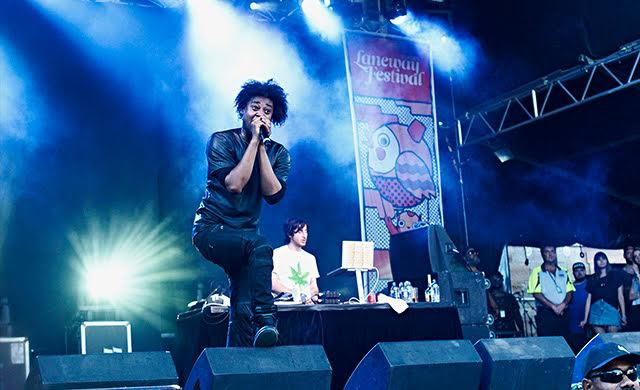By Noisey Staff
This article originally appeared on Noisey Australia.

Image: Daniel Knott
As Sinead O’Connor’s recent troubles prove, booking a show still isn’t as simple as it should be. The gig cycle for an artist is often two months booking, one hour performing and then two months chasing money. For a booker or promoter it’s more like two months booking a gig and one hour before the gig explaining where to load in, what time the opening band is on and dealing with drink tickets.
The guys behind Muzeek, a new Sydney based booking platform created by an artist, an indie-label owner, a venue manager and a fan, have set up an automated online process that takes the exasperation (and shitty spreadsheets) out of booking a gig.
The fast growing platform that has been used by the new Jimmy Den’s in Perth, VIVID Sydney, and a number of US venues, removes most of the “manual” process and is able to save venue costs, help artists and their teams earn more, and pass that savings on to fans.
We chatted to Muzeek’s Danny Fiorentini, who is also behind Outbox Records, and Todd Andrews who plays in These New South Whales and I Know Leopard to find out more.
Noisey: Why are bands, managers, agents and venues so bad at communicating? Is it a literacy thing and nobody has moved beyond a third grade reading level?
Danny Fiorentini: I think it’s a classic case of “ain’t nobody got time for that.” There’s way too much back-and-forth between all the layers. You can push a button right now and a private electric car will come pick you up somewhere. I can order tacos from a robot in my Slack channel. But I still need to have a week long conversation with a promoter or band to figure out what date is available to throw a party? We’re in an industry full of hyperactive, creative geniuses and yet we’re all anchored down with mind-numbing data entry. Formal communication is just something nobody has time for.
What do you think of Sinead’s recent problems? I don’t think any booking platform could have saved her in this situation.
Danny Fiorentini: Anytime an artist is left with 20 times less money than the people in charge of piling everyone into a room to watch them perform something is broken. She’s literally relying on some person/company to do a job. Except, their job is basically like this giant “trust-me” operation that’s based entirely on behind-the-scenes emails, magic wands and post-mortem reporting. She can’t just login to anyone else’s emails, so presumably she’s just trusting that everyone’s doing what they’re hired to do, for “X%.” If what she’s saying is true, basic transparency prevents this stuff; something our platform (and company) focuses on, first and foremost.
We provide technology for these good guys. We’re sort’ve like the “glue” between everyone; especially the indie venues, artists and agencies who don’t really have a “process” at all. So in the end run, transparent technology between people is key.
Why should venues care?
Danny Fiorentini: They have enough overhead to deal with and margins are small. If venues can not only save hours of tedious work everyday, but also actually use something useful that will spit data back to them automatically, it can only help in the long-run.
I like the interactive flyers (see below). It’s cool that you can listen to one of the bands on the line up while you are deciding what time you should be out having a smoke when that crappy middle band is playing.
Danny Fiorentini: Yeah I always found myself checking out all of these shows on my Facebook feed or on publications, and then searching for the bands’ music elsewhere. Or sometimes not at all. Nobody rolls into a movie without watching the trailer, right? We wanted to merge the concept of seeing who’s playing and listening to them right from the flyer. Not to mention, people and publications like you guys can embed them seamlessly and all the data flows back to the creators. So punters get a cooler experience, it’s actually useful for the people creating and promoting shows.
Todd, as an artist it’s good that it helps you get paid pronto. How else does Muzeek help bands/artists?
Todd Andrews: If it helps us get paid, I’m into it. We’re musicians not accountants, so it’s kind of stressful not knowing if or when you’re getting paid. Creating and sending and remembering and chasing up invoices requires a PhD in Microsoft Excel, and then an alarm clock for reminders to send emails. For example I currently have some pretty long outstanding payments I’m still waiting for, as well as a few DJ shows I can’t even remember if I’ve invoiced for, and I quite literally wouldn’t know if they’ve been paid or not. It’s no real fault of the promoters or mine, just a sign of the disconnected processes.
It’s cool to be able to instantly see all bookings, day of show worksheets, and tech spec info whenever I want; and it helps our tour manager a lot. So often on tour we’ve turned up to the wrong address for load in, or the promoter hasn’t received our tech specs, or we have no idea what time soundcheck is – once again not really anyone’s fault, but just sometimes musicians need to be hand fed – which is also probably why tour managers exist! Now I just login and see stuff happening.
A big reason that the manager/agent is taking their 10 % is not because of greed but because they are spending a bunch of time filling out booking forms, dealing with poorly set up spreadsheets and dealing with the very un rock and roll ‘processes’.
Danny Fiorentini: Coming directly from a manager/agent. I think this is the key here. People hire people to do stuff because time is money and artists just want to be artists. Managers and agents build invaluable relationships that are just part of the job. But as technology becomes more innovative, the less “busy-work” is involved, and the more people can focus on more important stuff like improving relationships.
Muzeek enhances relationships; not only externally with booking the shows but also internally within their respective teams. Actual “actions” are now tied in with calendars, so things like a venue “Confirming” a date notifies everyone in real-time. Contracts and Worksheets auto-fill according to who you’ve linked the booking to. Public event data automatically assembles based on the private data you’ve been working with. Reports and analytics are generated automatically. Holds can be advanced as an action vs. sending an email and then manually adjusting it. We’re basically taking as much “manual” stuff as we can possibly find, and automating or innovating those things to save venues a boatload of costs, help artists and their teams make more money, and pass that savings on to fans who attend their shows.



Leave a Reply